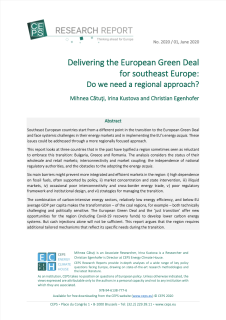
Southeast European countries start from a different point in the transition to the European Green Deal and face systemic challenges in their energy markets and in implementing the EU’s energy acquis. These issues could be addressed through a more regionally focused approach.
This report looks at three countries that, in the past, have typified a region sometimes seen as reluctant to embrace this transition: Bulgaria, Greece, and Romania. The analysis considers the status of their wholesale and retail markets; interconnectivity and market coupling; the independence of national regulatory authorities, and the obstacles to the adopting the energy acquis. It highlights six main barriers that might prevent more integrated and efficient markets in the region: i) high dependence on fossil fuels, often supported by policy, ii) market concentration and state intervention, iii) illiquid markets, iv) occasional poor interconnectivity and cross-border energy trade, v) poor regulatory framework and institutional design, and vi) strategies for managing the transition.
The combination of carbon-intensive energy sectors, relatively low energy efficiency, and below-EU average GDP per capita makes the transformation – of the coal regions, for example – both technically challenging and politically sensitive. The European Green Deal and the ‘just transition’ offer new opportunities for the region (including COVID-19 recovery funds) to develop lower carbon energy systems. However, cash injections alone will not be sufficient. This report argues that the region requires additional tailored mechanisms that reflect its specific needs during the transition.
